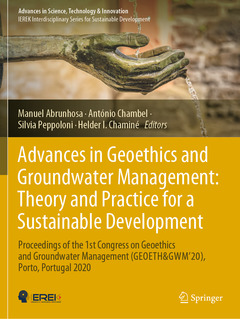Advances in Geoethics and Groundwater Management : Theory and Practice for a Sustainable Development, 1st ed. 2021 Proceedings of the 1st Congress on Geoethics and Groundwater Management (GEOETH&GWM'20), Porto, Portugal 2020 Advances in Science, Technology & Innovation Series

This book gathers the peer-reviewed proceedings of the 1st congress on Geoethics & Groundwater Management (GEOETH&GWM'20), held in Porto, Portugal, in an online format on 18-22 May 2020. Hosted in School of Engineering (ISEP), Polytechnic of Porto based on Porto city (a UNESCO World Heritage Site), the international conference focused on what has now been dubbed ?hydrogeoethics?, a novel transdisciplinary, scientific field integrating all dimensions of geoethics in groundwater science and practice. Given its scope, the book is of interest to all researchers and practitioners in the geosciences, hydrology, water resources, hydrogeology, natural resources management, environment, engineering, law, sociology, education, philosophy, culture, among others.
This joint congress is the result of a collaborative agreement between the IAH (International Association of Hydrogeologists) and IAPG (International Association for Promoting Geoethics) and reflects the need for concerted actions to achieve sustainable development.
The diversity, scale, significance and increasing magnitude of anthropogenic interactions with aquifers and groundwater, which often involve conflicting values or interests, call for analysis, discussions and decisions on the part of the agents involved, e.g. groundwater scientists, policymakers, managers, organisations, professionals and citizens. This approach calls for a responsible, sustainable and human approach to groundwater use and management.
The groundwater community involved in the exploration and exploitation, use and management of this increasingly vital natural resource is becoming more and more aware that ethical issues pervade all our attitudes from concept to action and need to be addressed. Diverse values and cultures, science and education, law and policies, human and natural environments and the public and the economic sectors view groundwater and its value and/or role differently. The authors believe that in a globalised and interconnected world, common ground must be found in the interest of peace, human development and sustainability.
The main topics covered here include:
1. Fundamentals of hydrogeoethics: cultures, principles and geoethical values on groundwater science and engineering
2. Lessons for a resilient and sustainable future with hydrogeoethics: case studies of geoethics in groundwater science-engineering, profession, and management
3. Scientific and humanistic components of hydrogeoethics in groundwater education and professional training
4. Socio-hydrogeology and ethical groundwater management
5. Geoethics of decision making under uncertainty and ethical issues in neglecting groundwater functioning
6. Groundwater: geological, legal, social, and ethical challenges of a unique natural resource
Manuel Abrunhosa
Manuel Abrunhosa was born in Porto in 1954 and graduated in Geology from the University of Porto, Portugal, in 1980, and in 1988 a Master in Groundwater Hydrology from the Polytechnic University of Catalonia, Barcelona.
He began a full-time professional career as a Junior Geologist (Hydrogeology and Engineering Geology) in 1977, before graduation, pursuing studies and continuing his first job as a contracted helper to the practical classes of disciplines of his Geology course in the University of Porto, from 1974 up to 1980. In 1981, he became a partner and director in a small company of Applied Geology and Hydrogeology services. Since then, he directed and was author and co-author of innumerable projects aimed at the private and public sector until 2009. In 1981, after public exams, he became a Lecturer in Geology at the Faculty of Sciences of the University of Porto, having taught theoretical and practical classes in Hydrogeology, Engineering Geology, Sedimentary Petrology, Geomorphology, Geological Cartographic Methods, Mineralogy, Crystallography, Structural Geology and oriented pedagogic internships in secondary schools. He did research in hydrogeology of fractured media and participated in national and international research projects in this subject aiming water resources and groundwater management in the Minho region (NW Portugal) and in the optimisation of groundwater exploitation in complex well-field thin coastal sandy aquifer. Other active interest in science includes natural heritage studies and geoarchaeology with collaborations beginning since as a student with research groups in archaeology, ethnology and history. He was involved in 1990 in the foundation of the first academic course on Environmental Health and Hygiene that included curricula in geology and hydrogeology. He was also involved in a first master’s in Environmental Marketing. He is often called as Forensic Geology expert witness and as pro bono scie
Date de parution : 03-2022
Ouvrage de 523 p.
21x27.9 cm
Disponible chez l'éditeur (délai d'approvisionnement : 15 jours).
Prix indicatif 210,99 €
Ajouter au panierDate de parution : 03-2021
Ouvrage de 523 p.
21x27.9 cm
Thème d’Advances in Geoethics and Groundwater Management... :
Mots-clés :
Earth Sciences; Groundwater; Geoethics; Sustainability; Climate Change


